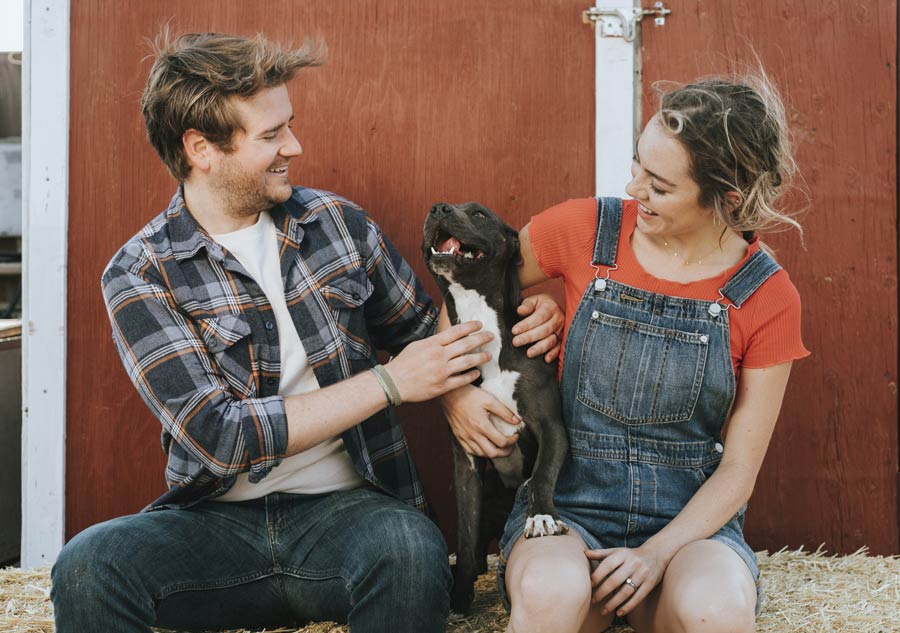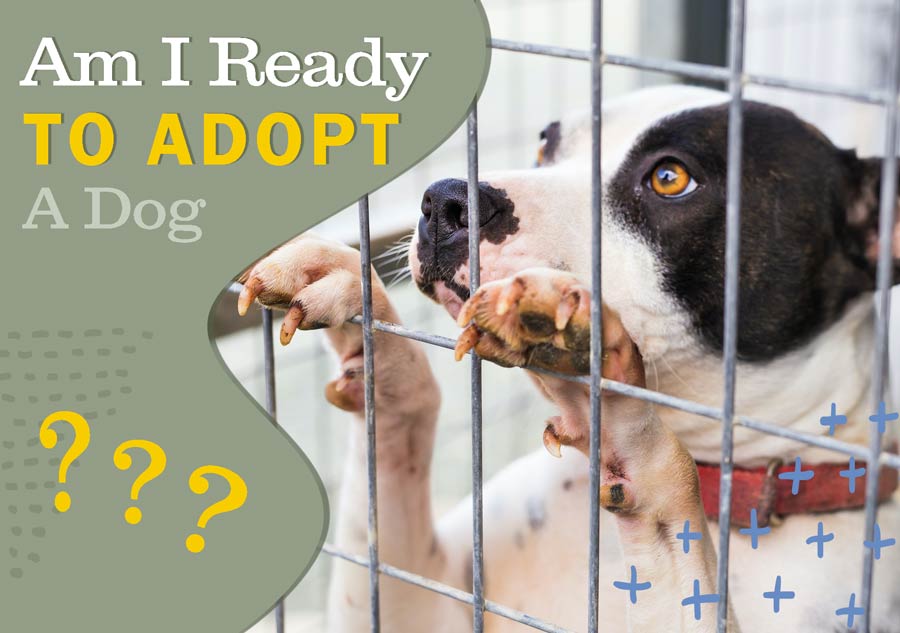Aw, doggies. They tug at your heartstrings. Sometimes all you have to do is see a puppy in the park or an adoption ad from your local animal shelter to make you feel sure that you simply must get a dog of your own! But not so fast, speed racer! Adopting a dog is a huge deal — a way bigger deal than you might have been led to believe. This article will explain why, and help you ask some of the most important questions you need to consider before bringing home an adorable doggie of your own. Ready to get started? Let’s go!
1. How am I doing?
How are you doing? While this seems like a simple enough question, and one which people are likely to ask us every day, we’ve been socially conditioned to answer “fine,” even when things are not so fine.
So, let’s try this again. How are you really doing? How are you feeling these days, on the inside? Do you have family and friends that you feel actively supported by? Do you have people in your life that really have your back? If you’re struggling, how kind and compassionate are you able to be with yourself vs. criticizing or blaming yourself?
The reason it’s important to ask these questions is that dogs require exceptional levels of emotional energy and investment, patience, and understanding, especially when they’re transitioning to a new environment. When they’re being acclimated to their new home and house rules, it’s imperative that you train them with positive reinforcement rather than punishment.
If you’re not at a place in your life where you’re either emotionally well-resourced or are not yet able to be kind and compassionate with yourself, you may want to work on getting yourself to a better place before you adopt a dog.
But wait, you might be thinking, many people who aren’t really doing okay adopt dogs for this very reason. I was hoping that by adopting a dog, things might actually get better for me. And even though I’m struggling, I know in my heart that I can be a good, responsible pet parent.
If anything like this is going through your head, good for you. There are exceptions to every rule. You don’t necessarily have to be the picture of mental health to be an amazing pet parent, but you do need to be really, really honest with yourself about your ability to meet your pet’s emotional, social, and physical needs. And as the rest of this article will show, in addition to how you’re doing personally, there are other equally important questions to be considered before making the Big Decision.
2. Am I making an informed decision about breed, and can I accept and embrace my dog for who they are?
One of the worst things that we human beings can experience is not being accepted for who we are. When somebody tries to change who we are to suit their tastes, it can run the gamut from annoying to devastating.
When you adopt or rescue a dog, it’s helpful to identify their breed or mix since this sheds light on their temperament and behavioral tendencies. When it comes to breed, you never want to try to “train the dog out of the dog.” For example, no matter what you do, virtually all Border Collies will want to herd things and be given a job.
Breeds are to dogs what different “personality types” or are to people. For example, in the Myers Briggs Personality Types, you might be an Advocate, a Commander, a Mediator, an Adventure, or any one of the 16 different types. This doesn’t mean that there’s not a lot of flexibility within a human personality type or dog breed, but it does mean there are strong tendencies that need to be honored, championed, and worked with rather than against.
Just like different human personality types, different dog breeds have different strengths and weaknesses. When you identify the breed/mix of your dog, you have additional insight into their temperament and abilities and what you can reasonably expect of them. Just as with a human partner, when you can accept and celebrate your dog for who they are — in both their breed tendencies and unique individuality — you’ll have a much healthier and happier experience together!
3. How much free time do I have for holistic pet education and recreation?
Let’s talk education and recreation. Though they seem to be the opposite, they have everything to do with each other when it comes to adopting a dog. Let’s take the education part first.
There is a lot of misinformation about the best ways to feed and care for your dog. Certain routine practices — especially when it comes to feeding your pet — can decrease the vitality and balance of your pet’s system. (And when vitality and balance are compromised, your pet is much more vulnerable to developing allergies, has lower immune resilience, and increased chronic health conditions, and all forms of dis-ease that disrupt their lives and wellbeing.

The Holistic Actions! website exists to provide comprehensive education about ways to feed, train, treat, and care for your pet to give them the happiest, healthiest, and longest life possible. The principles behind holistic petcare aren’t difficult to understand and can be incredibly gratifying and even enjoyable to learn about. But because the approaches of holistic petcare run counter to much of conventional (reductionistic) thinking, it does require an open mind and the willingness to become educated. (As a side note, educating yourself about canine nutrition and learning to feed your dog a fresh diet that you prepare for them at home — is the number one thing you can do for protecting, improving, and sustaining their health.)
Now that we’ve covered the education part, let’s turn to recreation. Dogs of all ages need opportunities for outdoor exercise and enrichment activities to ensure healthy emotional, social, and physical development. This may be a vigorous game of fetch or a leisurely sniff walk.
Fresh air and sunlight promote cellular vitality, and regular “sniff walks” allow your dog to explore the hundreds of different scents they encounter. A considerable amount of the canine brain is devoted to their sense of smell. Even though we can’t appreciate the complexity of what they are sensing with their fabulous noses, we know that stimulation of these olfactory centers contributes significantly to canine development and overall wellbeing.
To sum up, for dogs to be truly healthy and happy, they need high levels of active engagement from you and lots of exercise. So the question here is twofold. First, do you have sufficient free time to spend with your dog to ensure they’re getting adequate social contact? Second, are you willing to ensure your dog gets outside at least twice every day for fresh air, sniffing and exercise?
4. Are you prepared for courtship?
There’s a reason that human beings go through a relatively lengthy dating phase of their relationship before deciding to get married. Before saying “I do” and making a lifetime commitment to adopting or rescuing a dog, it’s a good idea to have a period of courtship through short-term hosting or fostering. This gives you a chance to see how you do together before getting intensely emotionally involved. It’s especially advisable if there are other pets in the household to consider.
Once you’ve made your decision, preparation is a necessity. Even if you adopt or rescue an older dog, they still need to navigate a huge transition to a new home and will take some time to get their mental and emotional bearings. Imagine you went to live with a new family and were expected to be almost instantly “adjusted.” Humans need time to settle into a new groove, and the same is true for dogs.
No matter the dog’s age you adopt or rescue, they need time to adjust, much as a new puppy does. The first 2-3 months “define” the relationship status and “pack order” in the dog’s mind. With your leadership and guidance, along with good management, they will start to understand how this new home works, and you’ll begin to see their true personality shine.

5. Can I afford it?
The cost of adopting and caring for a dog is estimated to range anywhere from a rock-bottom $650 for the tiniest dogs to $2,115 a year for the largest. (And by the way, that’s without things like basic medical care, emergency vet visits, pet training support, pet grooming, pet-sitting costs, and pet luxuries that many pet parents actually view as necessities.)
The majority of pet parents don’t have a budget, and it’s important to take stock of whether you have the financial resources to support the everyday care needs of your dogs. If your answer is yes, there’s actually a second question that’s just as important to ask. That question is whether you have the resources to deal with unexpected and potentially costly medical care. (It’s easy — especially when getting a puppy — to assume you’re years away from needing significant medical care. While this is a reasonably safe bet — provided you’re feeding your puppy a fresh food diet that you prepare at home and they’re getting plenty of fresh air and exercise — it’s also not a gamble you should be too quick to make.)
Trust that you and the dog will fatefully find your way together, in just the right time, and in just the right way.
Now that we’ve come to the end of this article, maybe you have an even better understanding of why adopting a dog is such a big deal. If you can answer yes to all five questions, it’s probably the perfect time to adopt or rescue a dog. If you can’t answer yes to these questions, that’s okay. Be confident in your ability to slowly but surely get yourself to the place you want to be. Trust that you and the dog will fatefully find your way together, in just the right time, and in just the right way. Maybe your dog is already out there waiting for you to be ready, or maybe they’re not even born yet. Whatever the case, if you move forward with faith in yourself and faith in the future, it will be only a matter of time before you and the doggie of your dreams are at last united!

